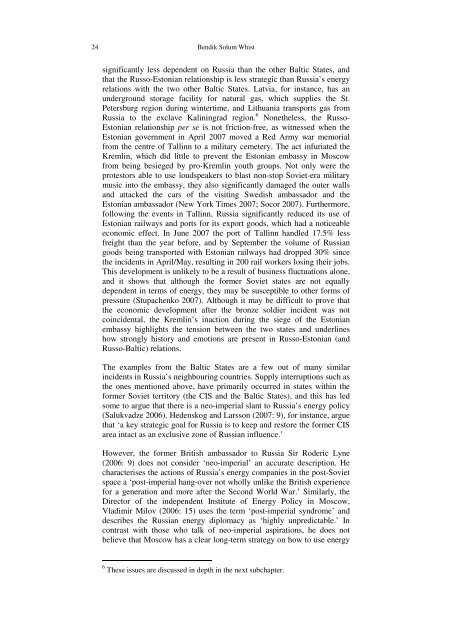Nord Stream: Not Just a Pipeline
Nord Stream: Not Just a Pipeline
Nord Stream: Not Just a Pipeline
Create successful ePaper yourself
Turn your PDF publications into a flip-book with our unique Google optimized e-Paper software.
24 Bendik Solum Whist<br />
significantly less dependent on Russia than the other Baltic States, and<br />
that the Russo-Estonian relationship is less strategic than Russia’s energy<br />
relations with the two other Baltic States. Latvia, for instance, has an<br />
underground storage facility for natural gas, which supplies the St.<br />
Petersburg region during wintertime, and Lithuania transports gas from<br />
Russia to the exclave Kaliningrad region. 6 Nonetheless, the Russo-<br />
Estonian relationship per se is not friction-free, as witnessed when the<br />
Estonian government in April 2007 moved a Red Army war memorial<br />
from the centre of Tallinn to a military cemetery. The act infuriated the<br />
Kremlin, which did little to prevent the Estonian embassy in Moscow<br />
from being besieged by pro-Kremlin youth groups. <strong>Not</strong> only were the<br />
protestors able to use loudspeakers to blast non-stop Soviet-era military<br />
music into the embassy, they also significantly damaged the outer walls<br />
and attacked the cars of the visiting Swedish ambassador and the<br />
Estonian ambassador (New York Times 2007; Socor 2007). Furthermore,<br />
following the events in Tallinn, Russia significantly reduced its use of<br />
Estonian railways and ports for its export goods, which had a noticeable<br />
economic effect. In June 2007 the port of Tallinn handled 17.5% less<br />
freight than the year before, and by September the volume of Russian<br />
goods being transported with Estonian railways had dropped 30% since<br />
the incidents in April/May, resulting in 200 rail workers losing their jobs.<br />
This development is unlikely to be a result of business fluctuations alone,<br />
and it shows that although the former Soviet states are not equally<br />
dependent in terms of energy, they may be susceptible to other forms of<br />
pressure (Stupachenko 2007). Although it may be difficult to prove that<br />
the economic development after the bronze soldier incident was not<br />
coincidental, the Kremlin’s inaction during the siege of the Estonian<br />
embassy highlights the tension between the two states and underlines<br />
how strongly history and emotions are present in Russo-Estonian (and<br />
Russo-Baltic) relations.<br />
The examples from the Baltic States are a few out of many similar<br />
incidents in Russia’s neighbouring countries. Supply interruptions such as<br />
the ones mentioned above, have primarily occurred in states within the<br />
former Soviet territory (the CIS and the Baltic States), and this has led<br />
some to argue that there is a neo-imperial slant to Russia’s energy policy<br />
(Salukvadze 2006). Hedenskog and Larsson (2007: 9), for instance, argue<br />
that ‘a key strategic goal for Russia is to keep and restore the former CIS<br />
area intact as an exclusive zone of Russian influence.’<br />
However, the former British ambassador to Russia Sir Roderic Lyne<br />
(2006: 9) does not consider ‘neo-imperial’ an accurate description. He<br />
characterises the actions of Russia’s energy companies in the post-Soviet<br />
space a ‘post-imperial hang-over not wholly unlike the British experience<br />
for a generation and more after the Second World War.’ Similarly, the<br />
Director of the independent Institute of Energy Policy in Moscow,<br />
Vladimir Milov (2006: 15) uses the term ‘post-imperial syndrome’ and<br />
describes the Russian energy diplomacy as ‘highly unpredictable.’ In<br />
contrast with those who talk of neo-imperial aspirations, he does not<br />
believe that Moscow has a clear long-term strategy on how to use energy<br />
6 These issues are discussed in depth in the next subchapter.













